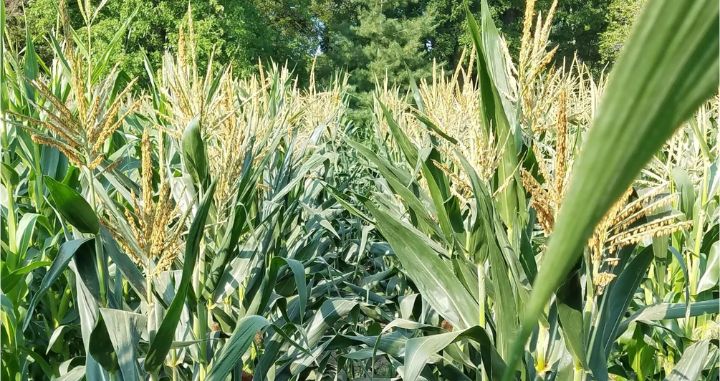
Dr. Walter Goldstein
Written by Dr. Walter Goldstein
I recently had the opportunity to join Vinnie Trometter, Policy Fellow at the Organic Farming Research Foundation, and staff from Congressman Bryan Steil’s (WI-01) office to discuss how several organic agricultural research programs help the Mandaamin Institute research revolutionary, nutritious, nitrogen-fixing organic corn varieties.
Breeding Corn for a Food-Secure Future
I founded the Mandaamin Institute back in 2011 to study how to breed corn that does not require fertilizers and is more nutritious and sustainable than the corn hybrids controlled by large multinational corporations. Our goal is to change the paradigm of corn production by showing that you can breed organic corn varieties that have similar yields to conventional corn and are competitive against weeds without the need to use synthetic fertilizers or herbicides. Our research shows that this is possible.
Our corn plants have been selected to partner with beneficial bacteria and mycorrhizae. Their tissues are strongly colonized with bacteria in the roots, epidermis, plant hairs, vascular tissues, silks, pollen, glumes, and embryos. Bacteria are passed from one generation to the next through the seed, and those bacteria actively colonize the plant and are extruded into the root zone through the root tip and root hairs.
 Through this, we have found that not only does root branching and root health improve, but nitrogen uptake increases substantially. This is because soil bacteria are taken up by the plant through the growing root system and then multiplied and consumed inside the plant as a result of the active oxidants produced by the plant. The dialogue with bacteria increases vitality and nutrient uptake and causes priming of the plant for stress and disease resistance. We have evidence that the defense systems in the root are dialed down to foster bacteria, but they are dialed up in the tops, which accumulate microbial nitrogen. Furthermore, we have isotopic evidence that some of our varieties are fixing substantial quantities of nitrogen from the air.
Through this, we have found that not only does root branching and root health improve, but nitrogen uptake increases substantially. This is because soil bacteria are taken up by the plant through the growing root system and then multiplied and consumed inside the plant as a result of the active oxidants produced by the plant. The dialogue with bacteria increases vitality and nutrient uptake and causes priming of the plant for stress and disease resistance. We have evidence that the defense systems in the root are dialed down to foster bacteria, but they are dialed up in the tops, which accumulate microbial nitrogen. Furthermore, we have isotopic evidence that some of our varieties are fixing substantial quantities of nitrogen from the air.
Some of our inbred varieties and hybrids also compete better with weeds and are less strongly affected by them than conventional varieties. Furthermore, yields under fertilized conditions have been about 10% less, but are generally higher than for conventional inbred corn under unfertilized conditions.
We have also found that our plants have higher nutritional value (more methionine, lysine, minerals, and carotenoids) than conventional corn. This translates to better quality poultry feed. Unlike traditional poultry feed, which is generally composed of a mixture of corn and soybeans, Mandaamin corn varieties are naturally high in protein and contain generated amino acids, usually supplemented in soybean-mixed poultry feeds. The enhanced value of the feed means 9% less soybean meal and no synthetic methionine is required. This allows poultry feeders to pay a 10% premium for the grain without increasing their overall feed costs, resulting in higher prices for egg producers.
Funding for Sustainable and Organic Agriculture Research
The Mandaamin Institute is working with dozens of organic farms and conventional farms, or in conditions that do not use synthetic pesticides or fertilizers, and are also limited in nitrogen, potassium, and phosphorus. The farms we partner with are in several states, but mostly in Wisconsin. Mandaamin Institute also does not patent the corn they give out to farmers, so they can partake in experiments themselves. For analysis, we work intensively with Rutgers University using the latest “omics” technology.
We use Organic Agriculture Research Extension Program (OREI) and Sustainable Agriculture Research Education (SARE) grants to fund our research. Using both programs allows us to experiment on both organic and non-organic land since OREI can only be used on organic acreage, while SARE usage does not have this restriction. Experimenting on both types of land is important because we can test our seeds across a range of soil conditions.
Our Meeting with Congress
Our meeting with Congressman Bryan Steil’s office went well. We met with one of his staffers who was well-informed and engaged on agriculture issues. He was sympathetic to our call, expressing the importance of organic agriculture research programs. It is important for organic agriculture researchers to directly communicate with their members of Congress about their work and how it impacts their districts, states, and regions. Those members of Congress can then carry on the message of researchers up to the USDA or the Agriculture Committee, where agricultural policy decisions are made.
Use Your Voice
Interested in sharing your research with legislators and highlighting the importance of ongoing public investment in organic research? Enroll in OFRF’s self-paced email course, Communicating with Legislators. This free workshop gives researchers and advocates in the organic farming community the tools to confidently connect with lawmakers and make your work count where decisions are made.



